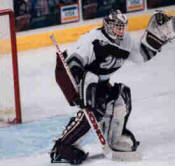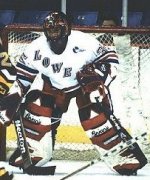… is going on with Hockey East goaltending? Hasek, a consensus choice as the world’s top netminder, opened the National Hockey League season with a 1-4-1 record and enough poor performances to earn a seat on the end of the bench. He then returned to action and promptly tore a groin muscle, an injury that is expected to sideline him for months.
While perhaps not as dramatic as Hasek’s fall from the pinnacle, Hockey East goaltending has certainly opened the season in upheaval. Some of the netminders expected to be among the best struggled in the early going, while several newcomers have already staked preliminary claims to the league’s upper class.
Let’s look, then, at the initial returns of how that position is faring throughout Hockey East.
The Established Number Ones
New Hampshire — Ty Conklin would be Exhibit A for the unexpected. Last season, the junior set a Hockey East record with a 1.64 goals-against average, and overall posted a 1.84 mark, second-best in nation, and a .932 save percentage. While splitting time with then-senior Sean Matile, Conklin allowed more than two goals in only three of the 16 regular-season games in which he played.
This year, however, he reached that total in each of his first three games. In the UNH home opener against Vermont, he allowed four goals on 22 shots. Then Lake Superior State got three past him the following weekend. But UNH remained undefeated, so there seemed no need to make much ado about nothing.
“He might not be on the top of his game so far,” said UNH coach Dick Umile at the time. “I don’t think the team is, or anyone is early in the season. He made the key saves when he had to. He’s not happy that he let in three goals, but you can start to get greedy because the kid always had it [at or] under two.”
Indeed, a critique would have seemed as absurd as claiming that Mark McGwire had “slumped” to a mere 65 home runs in 1999 after his record-shattering 70 one year earlier.
However, then came New Hampshire’s early-season Waterloo when the Wildcats fell at home to Rensselaer, 6-0. It was in every way a team loss, but Conklin surrendered all six goals on just 17 shots and, particularly in the third period, looked like anything but one of the league’s elite goaltenders.
Few people had expected Conklin to match last year’s gaudy statistics in light of UNH losing three of its top defensemen, but this dropoff appeared Hasek-ian.
Fortunately, Conklin (2.87 GAA, .895 SV%) has more recently returned to form, holding UMass-Lowell and UMass-Amherst to single goals in 2-1 wins as well as allowing only one of Yale’s five tallies in relief of backup Matt Carney.
“Ty’s in a groove right now,” said Umile. “He’s playing real well.”
UMass-Amherst — Markus Helanen (right), who probably entered the season as co-holder (with Conklin) of the title “Hockey East’s Top Goaltender,” seemed to share the early form of his UNH rival through the first few games. He wasn’t bad, but he wasn’t at his accustomed level.

“We got good goaltending from Markus,” said coach Joe Mallen after the Minutemen lost their opener to Colgate, 3-2, “but a couple broke off his equipment and in.”
The same thing happened one week later against Northeastern. Shots that Helanen had stopped cleanly last season were breaking into the net off his pads.
“We expect all of our guys to come off of last year and all of a sudden be playing exactly as well as they did in February,” said Mallen. “It takes a long time to get the timing down.”
As with Conklin, Helanen’s most recent efforts have been encouraging. Following a 4-1 loss to Boston College, he shut out Army, 1-0, and then allowed two goals in a tie with UMass-Lowell. Backup Mike Johnson got the nod in the 2-1 loss at New Hampshire.
For UMass-Amherst to make a move in the standings, however, Helanen will have to steal games like he did last year, most notably a three-out-of-four point November weekend against Maine when he stopped 87 of 89 shots. His statistics to date (2.53 GAA, .914 SV%) are fine, but the only win so far has come in overtime against Army, when his teammates held an overwhelming 55-19 shot advantage.
In league games, the Minutemen have either matched or outshot their opponents three times and recorded losses in each case. Admittedly, shot totals can be misleading, but UMass fans will know that Helanen is truly back in full force when their team starts recording wins in those games.
Boston College — Scott Clemmensen has been perhaps one of the most unappreciated goalies in recent memory. While some observers place him close to Conklin and Helanen, others consider him BC’s potential Achilles’ heel. No other league netminder spans such a wide range of evaluations.
In part, that’s a reflection of BC’s oft-overwhelming talent. With such a team, Clemmensen must often fill the role of Grant Fuhr on the dominating Edmonton Oilers teams that were led by Wayne Gretzky. Clemmensen must stay sharp whether he sees a lot of rubber or not.
He looked good the first two weekends, but faltered in a big way in BC’s 6-5 overtime loss at Minnesota. He had to wait nine days to redeem himself, but did so in a 4-1 win over UMass-Lowell.
“I thought Scott Clemmensen was terrific in goal,” said coach Jerry York after the game. “He was coming off an unusually poor effort in his last game and he bounced back and probably played his best game of the year.
“He hasn’t had a lot of all-league consideration because there’ve been great goaltenders here in Hockey East, [Michel] Larocque and Conklin last year and [Marc Robitaille the year before].
“He’s improving. The big thing about him is he’s just got to be consistent.”
For the first time in his three years, Clemmensen (2.47 GAA, .900 SV%) has some competition for playing time. Freshman Tim Kelleher (1.50 GAA, .927 SV%) has won both of his starts, including a 4-1 win at Minnesota that followed the overtime loss.
“We made up our mind that he was going to play before we went out there,” said York. “He’s had real good practices and has played pretty well now.
“The best of both worlds is to have two good goaltenders paying sharp all year. We’ll have to watch how [things develop]. It’d be great to have a tandem of goaltenders.
“The next 80 games [over this year and next] we’ll have those two goalies and I’m not sure if it’s going to be 60-20 or 40-40, but Timmy has come on hard.
“I’d like to think of them as a 1 and 1-A.”
Merrimack — Tom Welby is in much the same role as Helanen this year, looking to steal games in which the opponents hold the upper hand in play and nail down wins in the other games.
So far, the wins have come over Holy Cross, 5-2, and Union, 3-1, both of which fell into the “nail down” category. And in the October losses, Welby could hardly be blamed after facing 56 Boston College shots and 47 at St. Lawrence.
“He’s played very well for us,” said coach Chris Serino at the time. “Last year, he was thrown into a fire where everyone thought he was going to be like he played against BU in the [1998] playoffs. But he had only played five games that year, so last year was his first full year.
“He’s a much better goaltender this year. He’s very steady now and controls the tempo of the game better.
“I think he’s in the upper echelon of the goaltenders in the league.”
On Nov. 5, however, Welby got the hook after giving up five goals on just 14 Boston University shots. Sophomore Jason Wolfe performed the mop-up duty and then reprised that act one night later after senior Cris Classen played well in a 4-2 loss to the Terriers.
Welby (4.27 GAA, .887 SV%) is still “The Man” in the Merrimack nets, but the two backups could see more action.
Providence College — Boyd Ballard has been an enigma in his two-plus years as a Friar. It can be bewildering for PC fans to see a great stacked-pad save from the same goalie who allows a slapshot from near center ice to go in.
Against BU on Oct. 30, Ballard (3.41 GAA, .876 SV%) allowed an unscreened wrist shot from the point to sneak through the five hole, a softie that proved decisive in a 3-2 loss.
“As a goalie, you have to make the saves that you should make and then make some of the saves that you shouldn’t,” said coach Paul Pooley. “Some of the goals that go in are [saves he should make] and that’s what he needs to work on.
“He’s let a lot of poor goals up over his career, but he’s made a lot of huge saves. But they can’t coexist. You’ve got to take the bad goals out.
“I think he’s played well and is on the verge of getting there, but I don’t think he’s in the upper echelon yet.”
The Emerging Number Ones
Northeastern — Mike Gilhooly has made the biggest initial splash of the new goaltenders, earning both the Hockey East Rookie of the Month and Goaltender of the Month awards for October. And of all the new netminders, Gilhooly is the only one that had to beat out a returning starter.
“He’s a little catlike, which I like, and quick on his feet,” said coach Bruce Crowder after Gilhooly backstopped the Huskies to an early 2-0-0 record. “[His play] has been very encouraging for us.”
Even so, Crowder wasn’t about to dispense with last year’s returning top goalie, Jason Braun.
“I wouldn’t say that one kid has the nod over the other kid,” said Crowder. “We’re going to play with our hunches and take it from there. We’re going to play whoever we think will win the game for us.
“[But] right now, we see a little bit more in [Gilhooly]. That’s why he’s playing.”
Braun got his opportunity when Northeastern traveled to Wisconsin for a pair of games. Braun started the first game and, due to a problem with Gilhooly’s skate blade, played all but three and a half minutes in the second.
“We got good goaltending out of Jason Braun both nights,” said Crowder. “He played a great game on Friday night and made some key saves. I just decided to leave him in there the next night so he basically played almost all of that game.”
Sadly, Braun remained behind in Wisconsin to be with his ailing father and wasn’t expected to return until after the Nov. 13-14 weekend.
Gilhooly (2.17 GAA, .915 SV%) then proved instrumental in the Huskies’ 2-2 tie at Maine against the then top-ranked Black Bears, holding the fort during a first-period 15-7 shot disadvantage.
Nonetheless, Crowder is taking a wait-and-see approach.
“Obviously, Mike had a good October and he had a good game up at Maine,” said Crowder. “He’s got the ball and is going to run with it. But it’s early in the season and they don’t give out trophies this time of year.”
Boston University — No team entered the season with less experience in the nets, a rarity for the Terriers given coach Jack Parker’s strong preference for a goaltender rotation. But last year’s poor start and the heroics of Michel Larocque conspired to limit Jason Tapp to only two decisions — both losses — and a smattering of mop-up duty.
“I can’t remember having two guys who were [either] freshmen or sophomores who hadn’t played very much,” said Parker. “It was the first time we’ve opened up the season with that little experience.”
And those who doubted Tapp’s abilities nodded knowingly when BU traveled to Vermont, outshot the Catamounts, 48-20, and still lost, 7-4.
“There haven’t been too many times in my career that we’ve outshot a team by 30 shots and not won the game,” said Parker. “Goaltending was a big difference. Their goaltender set a career high with 44 saves and [Tapp] struggled at times and they were opportunistic. But we dominated every stage of the game except the scoreboard.”
Nonetheless, Parker didn’t discard the sophomore, even when his freshman partner in the BU no-experience rotation shined. And although it’ll take a while before Tapp’s statistics (3.54 GAA, .816 SV%) recover from the Vermont outing, Parker’s patience was rewarded recently with a strong performance against Merrimack. Tapp might have recorded a shutout if not for some sloppy defensive-zone play in the final six minutes, but still came away with a 4-2 win.
Ricky DiPietro (2.50 GAA, .903 SV%), the other half of the tandem, has prompted comparisons to Garth Snow with his puckhandling abilities. In time, he may prove to be the best of Hockey East’s freshman goaltenders.
“There’s no question that he adds another dimension to the game and makes it easier on the defensemen,” said Parker after a 3-2 win over Providence in which DiPietro was the difference. “One of the hardest things in hockey is going back to get the puck when someone’s bearing down on you, pick it off the wall and try to get it out of the zone. [With DiPietro] they can hold people up for a second and let him get it out of the zone for them.
“He made some great decisions and he can really execute. We recruited him knowing he was really good at that. But we also recruited him knowing that he can stop pucks and that’s the most important thing.”
Maine — The loss of Alfie Michaud from last year’s national championship team left only sophomore Mike Morrison, who compiled a 3-0-1 record and enviable statistics (1.73 GAA, .917 SV%) in limited play, and Matt Yeats, who redshirted last year.
When four games into the season the tandem had allowed three or more in each contest, Black Bear fans had to wonder. Three or four goals against Minnesota was one thing, but New Brunswick and Canisius?
In the next four games, however, Morrison (2.50 GAA, .908 SV%) and Yeats (2.27 GAA, .919 SV%) allayed those fears, holding Ohio State, Northeastern and Providence to two goals or less. Maybe the loss of Michaud wouldn’t hamstring Maine’s repeat hopes after all.
“They’re very consistent and I couldn’t ask anything more out of both of them,” said coach Shawn Walsh. “Anytime we give up a goal, people are going to say, ‘Oh, Alfie….’ They forget that Alfie was a guy who didn’t even get a vote for the all-league team.”
The omission had seemed like an injustice. Larocque, Conklin and Helanen all deserved the votes that they received, but UNH’s Sean Matile had struggled through his senior year and although he’d had an exceptional career his votes might have properly gone Michaud’s way.
“Some of the other goalies had better regular seasons,” said Walsh. “Alfie had the great postseason.
“But we’re getting goaltending every bit as good as we did last year at the start.”
UMass-Lowell — Like BU and Maine, the River Hawks faced a major question in goal following the graduation of Scott Fankhouser. Jimi St. John (left) had looked overmatched in the first half of his freshman season and, despite making major strides in the second half, still had accumulated very little game action (1-5-0, 4.82 GAA, .854 SV%).

St. John was joined by Cam McCormick, whose last contest had been on Dec. 19, 1997. The British Columbia native arrived on campus in January, 1998, but had played in two major junior games and, as a result, had to sit out an entire year. He then redshirted the final three months of the 1998-99 campaign to avoid using up another entire year of eligibility.
So in early October it was anyone’s guess how good the goaltending would be for Lowell.
As it has turned out, St. John (1-2-1, 3.21 GAA, .883 SV%) has continued to show progress and McCormick (1-3-0, 3.01 GAA, .870 Sv%) has proven worth the wait.
“I couldn’t be happier,” said coach Tim Whitehead. “Our goalies have been tremendous. They’re coming along quicker than we thought. They both still have things they want to work on, but they are working on them and they are making progress.
“Even if there’s a goal or two that they’d like to have back because of something they’re working on, I’ve been very pleased with where they’re going. I know where they’ll be eventually.
“I’m happy. Our goals-against is down. … Long-term, we should be in a very good situation.”


